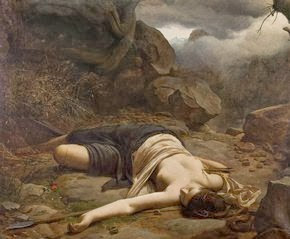Chione was the daughter of Daedalion, a courageous, yet merciless, warrior. She was a beautiful lady desired by mortals and immortals, including the gods Apollo and Hermes. Hermes used magic to make Chione fall to sleep and then raped her. Later that night, Apollo visited her as well, transformed into an old woman and also slept with her. As a result of that night, Chione gave birth to the notorious thief Autolycus, whose father was Hermes, and Philammon, by Apollo. Having charmed two gods, Chione boasted that she was more beautiful than goddesses like Artemis. The latter decided to punish her and shot Chione with an arrow, killing her. Daedalion, overcome with grief, tried to kill himself by jumping into the funeral pyre of his daughter, but he was stopped in time. He eventually went to the top of the Mount Parnassus and jumped off, but before he reached the ground, Apollo transformed him into a majestic hawk, feeling sorry for the man's grief.
SISYPHUS, son of Aeolus, married Atlas ’s daughter Merope, the Pleiad, who bore him Glaucus , Ornytion , and Sinon, and owned a fine herd of cattle on the Isthmus of Corinth. b. Near him lived Autolycus , son of Chione , whose twin-brother Philammon was begotten by Apollo , though Autolycus himself claimed Hermes as his father. c. Now, Autolycus was a past master in theft, Hermes having given him the power of metamorphosing whatever beasts he stole, from horned to unhorned, or from black to white, and contrariwise. Thus although Sisyphus noticed that his own herds grew steadily smaller while those of Autolycus increased, he was unable at first to accuse him of theft; and therefore, one day, engraved the inside of all his cattle’s hooves with the monogram SS or, some say, with the words ‘Stolen by Autolycus’. That night Autolycus helped himself as usually and at dawn hoof-prints along the road provided Sisyphus with sufficient evidence to summon neighbours in witness of the th...

Comments
Post a Comment